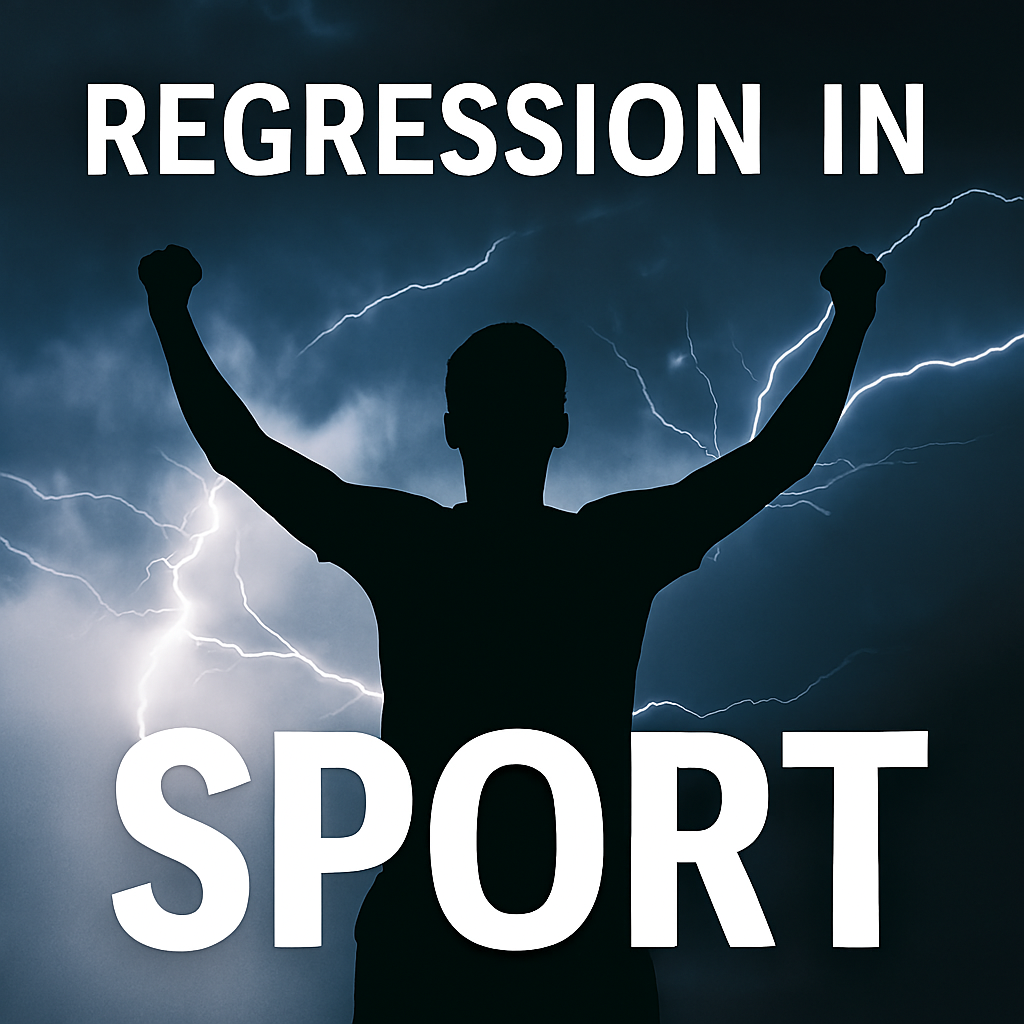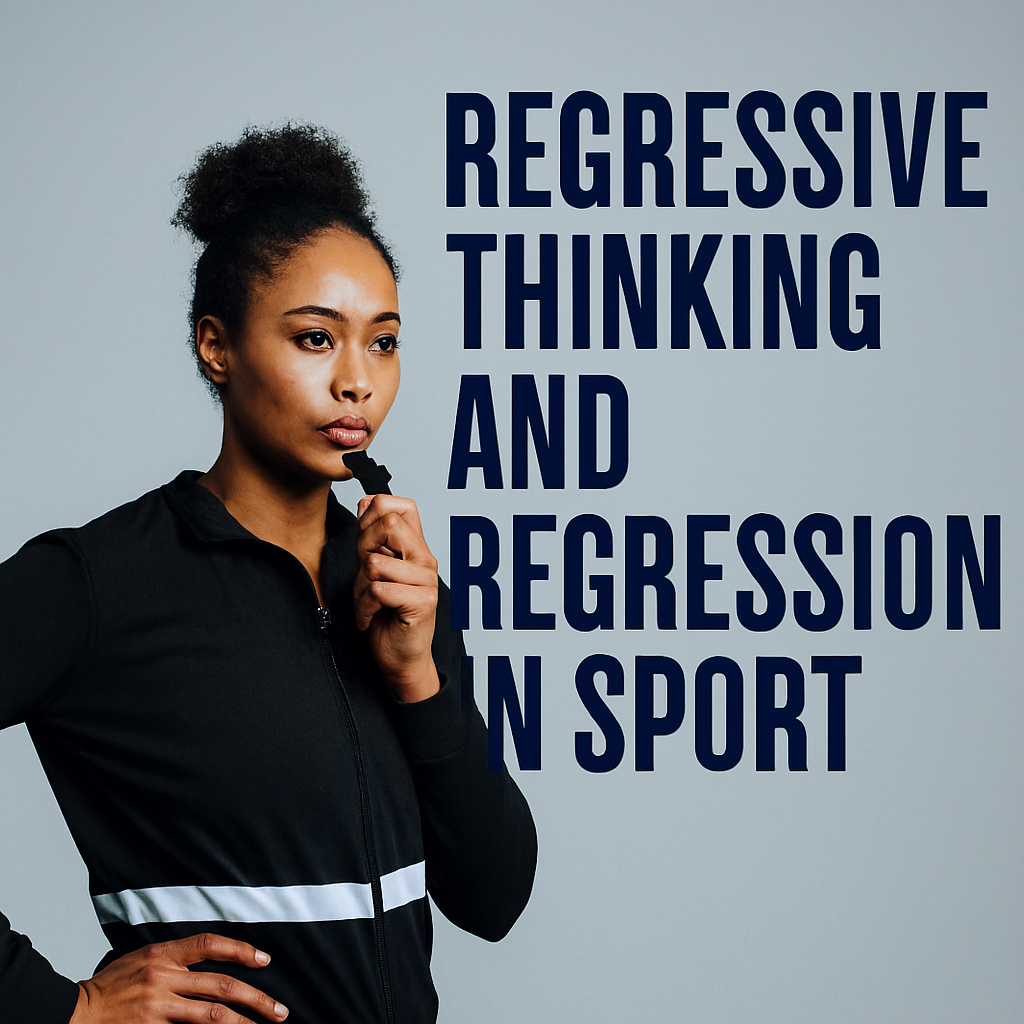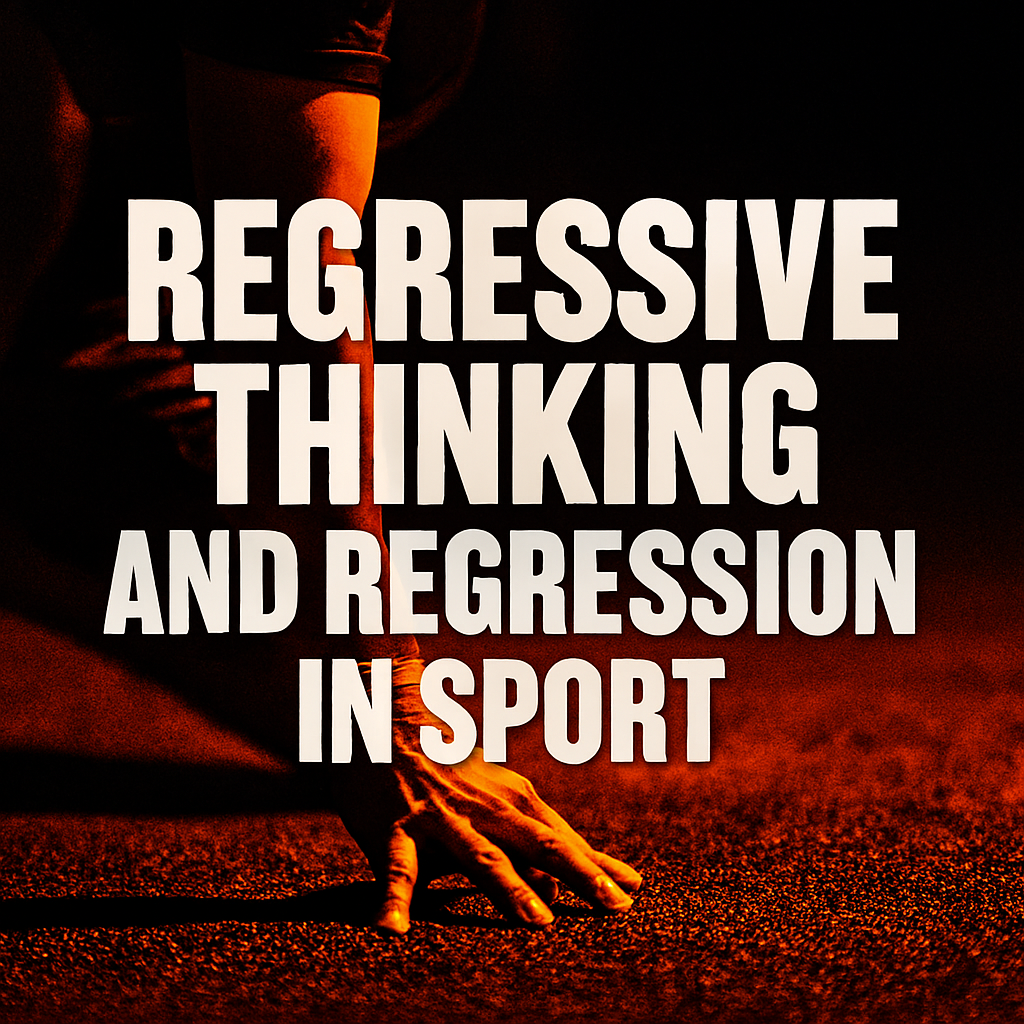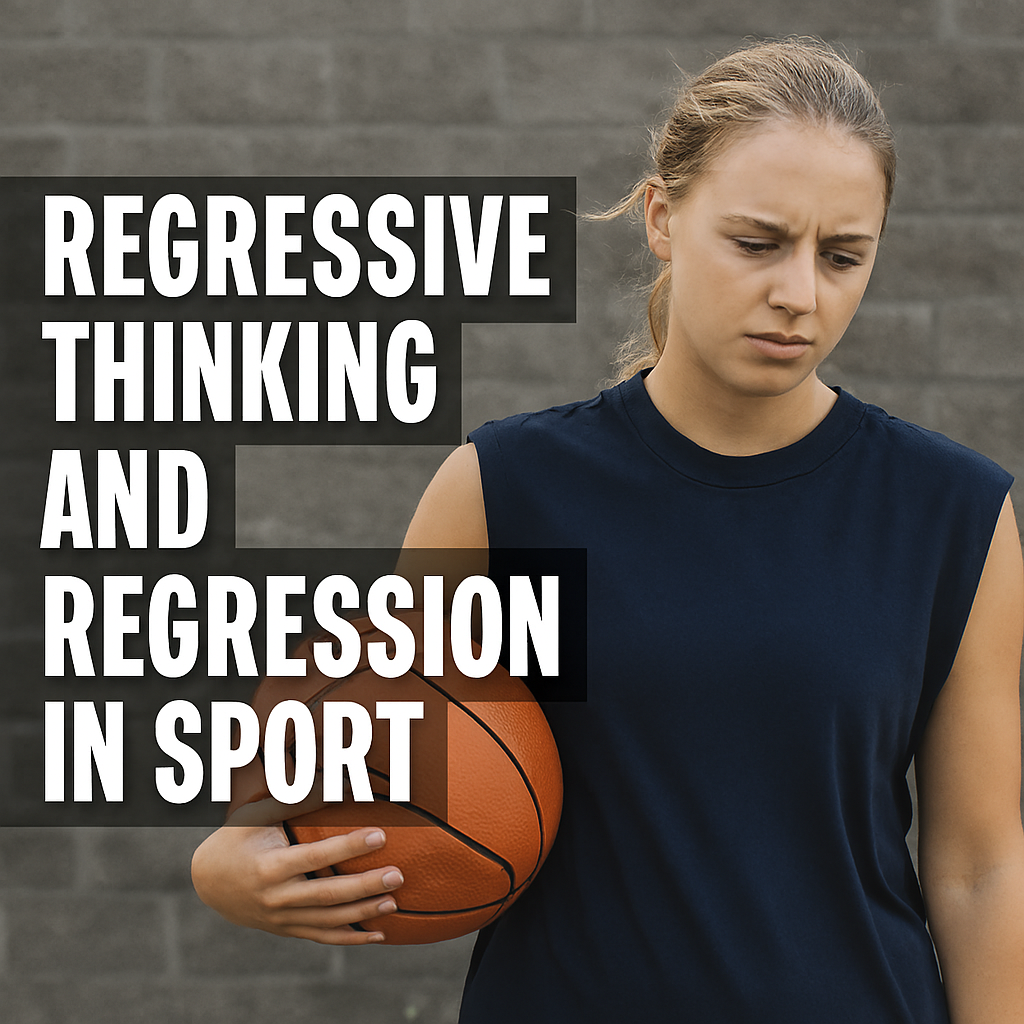Sport Regressive Thinking And Dynamic Regression Philosophy
Dynamic Regression Philosophy
Sport Regressive Thinking
Sport Regressive Thinking describes the tendency to revert to outdated methods despite modern evidence. It often emerges when athletes or coaches feel pressure and fall back on familiar but less effective strategies. Regression in sport also refers to measurable declines in performance caused by poor adaptation. These patterns can be seen across training, coaching, governance, and cultural representation. Understanding regression requires understanding the change both psychological and physical dimensions. Athletes may regress mentally under stress, while organizations regress structurally by resisting innovation. Regression is not always intentional but often results from fear of change. It can be temporary, such as fatigue-related decline, or long-term, such as systemic resistance. Studying regression helps identify solutions for sustainable progress.

Historical Roots Of Regressive Thinking
Tradition has shaped sport for centuries, but tradition can also foster regression. Many teams cling to outdated methods because they are familiar, even when evidence shows better alternatives. Historical regression often arises from cultural inertia and loyalty to past successes. For example, early football resisted fitness science, believing natural talent was enough. Cricket organizations once dismissed psychology as irrelevant. These patterns show regression rooted in resistance to innovation. Athletes trained under regressive systems often underperformed compared to modern peers. Regression in history highlights the importance of adaptation. Without change, sport stagnates and loses competitive edge. Examining history reveals how regression persists across generations.
| Era | Example Of Regression | Impact On Performance |
|---|---|---|
| 1950s | Minimal focus on nutrition | Athletes fatigued quickly |
| 1970s | Resistance to strength training | Slower, weaker players |
| 1990s | Limited use of analytics | Missed tactical opportunities |
| 2000s | Ignoring mental health | Increased burnout |
Psychological Dimensions Of Regression
Regression in sport is deeply psychological, often triggered by stress or anxiety. Athletes may revert to old habits under pressure, even when trained in modern techniques. Coaches regress by relying on rigid playbooks instead of adaptive strategies. Comfort zones reinforce outdated practices, limiting growth. Fear of failure or loss can drive conservative decisions that hinder innovation. Regression is amplified by cultural expectations that discourage risk-taking. Mental health neglect worsens regression by reducing resilience. Pressure situations magnify fallback behaviors. Psychological regression is as damaging as physical decline. Building resilience is essential to prevent mental regression.
- Athletes revert to outdated techniques under stress
- Coaches rely on rigid strategies instead of adaptive play
- Comfort zones reinforce regression
- Fear of failure drives conservative choices
- Cultural expectations discourage risk-taking
- Neglect of mental health worsens regression
- Pressure magnifies fallback behaviors
- Regression is both mental and physical
- Resilience reduces regression risks
- Progressive psychology sustains performance
Regression In Coaching Philosophy
Coaching philosophies often regress when leaders prioritize control over creativity. Some coaches discourage experimentation, fearing mistakes, which limits player growth. Regression in philosophy results in predictable tactics and reduced adaptability. Teams led by regressive coaches struggle against innovative opponents. Authoritarian styles suppress innovation and reinforce outdated systems. Creativity is undervalued in regressive coaching environments. Player development stalls when coaches resist progressive methods. Regression in philosophy reflects outdated leadership models. Adaptive coaching reduces regression risks. Progressive philosophies sustain long-term success.
- Coaches discourage experimentation
- Fear of mistakes limits creativity
- Predictable tactics reduce adaptability
- Regression stems from authoritarian styles
- Innovation is suppressed by rigid systems
- Player growth is hindered by control
- Teams struggle against adaptive opponents
- Regression reflects outdated leadership models
- Creativity is undervalued in regressive coaching
- Progressive coaching reduces regression
Regression In Performance Metrics
Performance metrics reveal regression when athletes fail to maintain consistency. Declines in speed, accuracy, or endurance often signal regressive patterns. Regression can be temporary, caused by fatigue, or long-term, linked to poor training. Monitoring metrics helps identify regression early. Data-driven approaches reduce unnoticed decline. Regression in metrics highlights the importance of measurement. Without metrics, regression remains hidden. Athletes benefit from consistent monitoring. Regression in metrics is preventable with proactive strategies. Performance data sustains competitive advantage.
| Metric | Regression Indicator | Cause | Prevention |
|---|---|---|---|
| Speed | Slower sprint times | Fatigue, poor training | Interval conditioning |
| Accuracy | Decline in shooting | Anxiety, lack of focus | Mental training |
| Endurance | Reduced stamina | Overtraining | Balanced workload |
| Recovery | Longer recovery times | Poor nutrition | Tailored diet |
Regression In Team Dynamics
Team dynamics regress when communication breaks down. Players revert to individualistic play, ignoring collective strategies. Regression in dynamics reduces cohesion and trust. Teams that fail to adapt socially underperform despite talent. Regression in dynamics is relational as well as technical. Leadership influences regression in team culture. Poor conflict resolution accelerates regression. Regression undermines collective performance. Strong dynamics prevent regression. Cohesion sustains long-term success.
- Communication breakdown triggers regression
- Players revert to individualistic play
- Cohesion declines under regressive dynamics
- Trust erodes when regression occurs
- Regression reduces collective performance
- Social adaptation prevents regression
- Leadership influences team regression
- Regression reflects poor conflict resolution
- Teams underperform despite talent
- Strong dynamics reduce regression

Regression In Tactical Innovation
Tactical innovation prevents regression, but outdated strategies persist. Teams relying on predictable tactics regress competitively. Regression in tactics makes play easy to counter. Innovative opponents exploit regressive teams. Tactical regression reflects fear of experimentation. Analytics reduce tactical regression risks. Regression occurs when teams ignore evolving strategies. Modern tactics sustain adaptability. Regression in tactics undermines competitive edge. Continuous evolution prevents decline.
| Sport | Regressive Tactic | Modern Tactic | Impact |
|---|---|---|---|
| Football | Long-ball reliance | Possession-based play | Reduced control |
| Basketball | Isolation-heavy offense | Motion offense | Limited scoring options |
| Cricket | Defensive batting | Aggressive strike rotation | Lower run rates |
| Tennis | Baseline-only play | Mixed court coverage | Predictable rallies |
Regression In Athlete Development
Athlete development regresses when youth programs ignore holistic growth. Overemphasis on winning and not udnerstanding losing at early stages leads to burnout. Regression occurs when skill diversity is neglected. Modern development emphasizes balanced growth, but regressive systems focus narrowly. This creates long-term limitations for athletes. Regression in development reflects outdated priorities. Holistic approaches prevent regression. Narrow focus reduces adaptability. Progressive development sustains success. Regression limits athlete potential.
- Youth programs overemphasize winning
- Burnout results from regressive development
- Skill diversity is neglected
- Regression limits long-term growth
- Holistic development prevents regression
- Narrow focus reduces adaptability
- Modern systems emphasize balance
- Regression reflects outdated priorities
- Athlete potential is restricted
- Progressive development sustains success
Regression In Sports Medicine
Sports medicine prevents regression, but outdated practices worsen decline. Ignoring recovery science leads to injuries. Regression occurs when medical staff rely on outdated treatments. Modern sports medicine emphasizes prevention and monitoring. Regression in medicine increases injury rates. Athletes regress physically without proper medical support. Regression reflects resistance to science. Preventive medicine sustains athlete health. Regression undermines long-term performance. Modern medicine reduces decline.
| Medical Practice | Regressive Approach | Modern Approach | Outcome |
|---|---|---|---|
| Injury Treatment | Reactive only | Preventive focus | Reduced injuries |
| Recovery | Ignored | Monitored rest | Sustained health |
| Nutrition | Basic advice | Scientific planning | Faster recovery |
| Monitoring | Minimal | Data-driven | Early detection |
Regression In Fan Engagement
Fan engagement regresses when organizations ignores new and or modern communication channels. Traditional methods like print-only updates limit reach. Regression occurs when clubs fail to adapt digitally. Modern fan engagement emphasizes interactive experiences. Regression reduces loyalty and connection. Fans disengage under regressive systems. Regression reflects poor communication strategy. Modern engagement builds loyalty. Regression reduces revenue potential. Progressive engagement sustains growth.
- Ignoring digital platforms causes regression
- Print-only updates limit reach
- Regression reduces fan loyalty
- Interactive experiences prevent regression
- Clubs must adapt to modern channels
- Regression reflects poor communication strategy
- Fans disengage under regressive systems
- Modern engagement builds loyalty
- Regression reduces revenue potential
- Progressive engagement sustains growth
Regression In Governance
Governance regresses when organizations resist transparency. Corruption and favoritism reflect regressive governance. Modern governance emphasizes accountability and fairness. Regression undermines trust in sport. Transparent governance prevents decline. Regression reflects weak oversight. Fairness sustains integrity. Regression reduces credibility. Progressive governance builds trust. Regression damages reputation.
| Governance Aspect | Regressive Practice | Modern Practice | Impact |
|---|---|---|---|
| Transparency | Limited | Open reporting | Increased trust |
| Accountability | Weak | Strong oversight | Reduced corruption |
| Fairness | Ignored | Equal opportunity | Sustained integrity |
| Decision-Making | Closed | Inclusive | Better outcomes |
Regression In Technology Adoption
Technology adoption prevents regression, but resistance leads to decline. Teams ignoring analytics regress competitively. Regression occurs when organizations reject innovation. Modern sport thrives on technology integration. Regression reflects fear of change. Innovation sustains progress. Regression undermines growth. Technology adoption builds resilience. Regression reduces competitive edge. Modern sport demands adaptation.
- Ignoring analytics causes regression
- Resistance to innovation limits progress
- Regression reduces competitive edge
- Technology integration sustains success
- Regressive teams fall behind rivals
- Modern sport thrives on data
- Regression reflects fear of change
- Innovation prevents decline
- Technology adoption builds resilience
- Regression undermines growth

Regression In Cultural Representation
Cultural representation regresses when sport ignores diversity. Regression occurs when organizations fail to include multicultural perspectives. Modern sport emphasizes inclusivity. Regression alienates communities. Cultural regression reduces global appeal. Diversity sustains relevance. Regression reflects narrow representation. Inclusivity builds stronger communities. Regression undermines engagement. Progressive representation sustains growth.
| Cultural Aspect | Regressive Practice | Modern Practice | Impact |
|---|---|---|---|
| Diversity | Ignored | Celebrated | Wider appeal |
| Inclusion | Limited | Broad | Stronger community |
| Representation | Narrow | Multicultural | Global relevance |
| Engagement | Minimal | Active | Sustained growth |
Regression In Sponsorship Models
Sponsorship regresses when organizations rely on outdated models. Regression occurs when sponsors ignore digital platforms. Modern sponsorship emphasizes interactive branding. Regression reduces sponsor value. Outdated sponsorship limits reach. Regression reflects poor adaptation. Modern models sustain revenue. Regression undermines partnerships. Progressive sponsorship builds engagement. Regression damages financial stability.
- Outdated sponsorship limits reach
- Regression reduces sponsor value
- Ignoring digital platforms causes regression
- Modern sponsorship emphasizes interactive branding
- Regression reflects poor adaptation
- Modern models sustain revenue
- Regression undermines partnerships
- Progressive sponsorship builds engagement
- Regression damages financial stability
- Sponsorship innovation prevents decline
Regression In Disability Inclusion
Disability inclusion in sport often regresses when organizations fail to provide equal opportunities. Regression occurs when adaptive programs are underfunded or overlooked. Athletes with disabilities face barriers when facilities are inaccessible. Regression reflects outdated attitudes that underestimate adaptive potential. Modern sport emphasizes inclusivity through specialized training and equipment. Regression undermines diversity and representation. Inclusive practices prevent regression by valuing all athletes equally. Regression in disability inclusion reduces participation and visibility. Progressive approaches highlight the achievements of disabled athletes.
| Aspect | Regressive Practice | Modern Practice | Impact |
|---|---|---|---|
| Accessibility | Limited facilities | Inclusive infrastructure | Increased participation |
| Funding | Underfunded programs | Equal investment | Sustained growth |
| Representation | Minimal visibility | Celebrated achievements | Broader recognition |
| Training | Ignored adaptive needs | Specialized coaching | Enhanced performance |
Regression In Media Coverage
Media coverage regresses when disabled athletes or minority sports are ignored. Regression occurs when coverage focuses only on mainstream events. This reduces visibility and recognition for diverse athletes. Regression reflects outdated priorities in broadcasting. Modern coverage emphasizes inclusivity and balance. Regression undermines representation and fairness. Media regression reduces sponsorship opportunities. Progressive coverage sustains diversity. Regression damages credibility of sport journalism. Inclusive media prevents decline.
- Coverage ignores disabled athletes
- Regression focuses only on mainstream events
- Visibility declines under regressive coverage
- Representation is undermined
- Sponsorship opportunities are reduced
- Regression reflects outdated priorities
- Modern coverage emphasizes inclusivity
- Progressive coverage sustains diversity
- Regression damages credibility
- Inclusive media prevents decline
Regression In Education And Research
Education and research regress when sport science is underfunded. Regression occurs when outdated theories dominate curricula. Modern sport requires evidence-based approaches. Regression undermines athlete development. Research regression reduces innovation. Education regression limits coaching quality. Progressive education sustains growth. Regression reflects resistance to new knowledge. Modern research prevents decline. Education and research are vital to progress.
| Area | Regressive Practice | Modern Practice | Impact |
|---|---|---|---|
| Curriculum | Outdated theories | Evidence-based learning | Better coaching |
| Research | Minimal funding | Strong investment | Innovation growth |
| Athlete Studies | Ignored | Inclusive focus | Broader development |
| Knowledge Sharing | Limited | Open access | Faster progress |

Regression In Policy Development
Policy development regresses when governments ignore evolving needs. Regression occurs when outdated laws restrict inclusivity. Modern policy emphasizes fairness and adaptability. Regression undermines equality in sport. Policy regression reduces participation. Progressive policy sustains growth. Regression reflects weak governance. Modern policy prevents decline. Policy development is central to inclusivity. Regression damages credibility of institutions.
- Governments ignore evolving needs
- Outdated laws restrict inclusivity
- Regression undermines equality
- Policy regression reduces participation
- Progressive policy sustains growth
- Regression reflects weak governance
- Modern policy prevents decline
- Policy development is central to inclusivity
- Regression damages credibility
- Institutions must adapt to prevent regression
Regression In International Competition
International competition regresses when outdated formats persist. Regression occurs when inclusivity is ignored. Modern competition emphasizes diversity and fairness. Regression undermines global appeal. International regression reduces participation. Progressive competition sustains relevance. Regression reflects resistance to change. Modern formats prevent decline. International sport thrives on adaptation. Regression damages credibility worldwide.
| Competition Aspect | Regressive Practice | Modern Practice | Impact |
|---|---|---|---|
| Formats | Outdated | Adaptive | Increased relevance |
| Inclusivity | Ignored | Emphasized | Broader participation |
| Representation | Narrow | Global | Stronger appeal |
| Governance | Closed | Transparent | Sustained trust |
Regression In Sponsorship Equity
Sponsorship equity regresses when minority sports are ignored. Regression occurs when funding is concentrated in mainstream events. Modern equity emphasizes balanced investment. Regression undermines diversity. Sponsorship regression reduces opportunities. Progressive equity sustains growth. Regression reflects outdated priorities. Modern equity prevents decline. Sponsorship equity builds fairness. Regression damages inclusivity.
- Minority sports ignored in sponsorship
- Funding concentrated in mainstream events
- Regression undermines diversity
- Sponsorship regression reduces opportunities
- Progressive equity sustains growth
- Regression reflects outdated priorities
- Modern equity prevents decline
- Sponsorship equity builds fairness
- Regression damages inclusivity
- Balanced investment sustains sport
Regression In Athlete Rights
Athlete rights regress when organizations ignore welfare. Regression occurs when contracts limit freedom. Modern sport emphasizes fairness and protection. Regression undermines trust. Athlete regression reduces motivation. Progressive rights sustain growth. Regression reflects weak governance. Modern rights prevent decline. Athlete rights are central to progress. Regression damages credibility.
| Rights Aspect | Regressive Practice | Modern Practice | Impact |
|---|---|---|---|
| Contracts | Restrictive | Fair | Increased trust |
| Welfare | Ignored | Protected | Sustained motivation |
| Freedom | Limited | Supported | Stronger engagement |
| Representation | Minimal | Inclusive | Broader fairness |

Regression In Community Engagement
Community engagement regresses when sport ignores grassroots. Regression occurs when focus is only on elite levels. Modern engagement emphasizes inclusivity. Regression undermines participation. Community regression reduces growth. Progressive engagement sustains relevance. Regression reflects outdated priorities. Modern engagement prevents decline. Community sport builds resilience. Regression damages connection.
- Grassroots ignored in regressive systems
- Focus only on elite levels
- Regression undermines participation
- Community regression reduces growth
- Progressive engagement sustains relevance
- Regression reflects outdated priorities
- Modern engagement prevents decline
- Community sport builds resilience
- Regression damages connection
- Inclusivity sustains community growth
Regression In Innovation Culture
Innovation culture regresses when organizations resist experimentation. Regression occurs when fear of failure dominates. Modern sport thrives on innovation. Regression undermines adaptability. Innovation regression reduces competitiveness. Progressive culture sustains growth. Regression reflects outdated mindsets. Modern innovation prevents decline. Innovation culture builds resilience. Regression damages progress.
| Innovation Aspect | Regressive Practice | Modern Practice | Impact |
|---|---|---|---|
| Experimentation | Discouraged | Encouraged | Increased adaptability |
| Risk-Taking | Avoided | Supported | Stronger competitiveness |
| Creativity | Suppressed | Valued | Sustained growth |
| Adaptability | Limited | Broad | Better resilience |
Regression In Ethical Standards
Ethical standards regress when corruption persists. Regression occurs when fairness is ignored. Modern sport emphasizes integrity. Regression undermines trust. Ethical regression reduces credibility. Progressive standards sustain growth. Regression reflects weak governance. Modern ethics prevent decline. Ethical standards build resilience. Regression damages reputation.
- Corruption persists under regression
- Fairness ignored in regressive systems
- Modern sport emphasizes integrity
- Regression undermines trust
- Ethical regression reduces credibility
- Progressive standards sustain growth
- Regression reflects weak governance
- Modern ethics prevent decline
- Ethical standards build resilience
- Regression damages reputation
Conclusion
Regression in sport is a multifaceted issue that spans psychology, training, governance, and culture. Regressive thinking reflects fear of change and reliance on outdated methods. Regression undermines performance, cohesion, and innovation. Modern approaches prevent regression through adaptation and inclusivity. Regression is preventable with proactive strategies. Continuous evolution sustains success. Regression damages credibility and growth. Progressive thinking builds resilience. Regression highlights the importance of innovation. Sport thrives when regression is replaced with progress.
Join The Discussion
Regression in sport is a challenge that affects athletes, coaches, and organizations alike. What examples of regression have you observed in your favorite sports? How do you think modern strategies can prevent decline?
#RegressionInSport #SportsInnovation #AthleteDevelopment #CoachingPhilosophy #SportsCulture #PerformanceMetrics #FanEngagement #SportsGovernance #SportsMedicine #SportsTechnology







One Comment
Comments are closed.